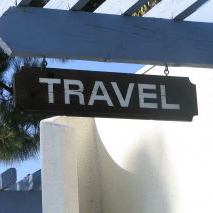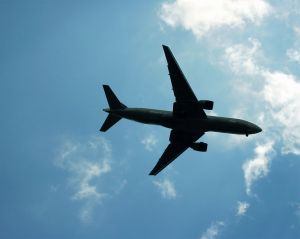Travel News
Frequent Flier Rules, Airlines & Travel News: Leigh Gallagher Interview
 If playing the
If playing thefrequent-flier mile game leaves you dazed and confused, you’re not alone. Peter checked in with Fortune magazine’s assistant managing editor,
Leigh Gallagher, about the devaluing of frequent-flier miles, and to get her
predictions for travel in 2011.
Peter Greenberg: I’ve been ranting and raving about my favorite
subject: the inherent fraud of frequent-flier programs where you cannot redeem
the miles you’ve earned. And yet, we all like to boast about how many we have.
Isn’t that pathetic?
One of my suggestions was to get all the lawyers to unite, and file a
class-action lawsuit against the airlines, claiming they’re running an illegal
and unregulated lottery when it comes to frequent-flier programs. What do you
think? You think I’ve got a shot at this?
Leigh Gallagher: I think you definitely have a shot at this.
Look, I’m a big, big fan of consumer rights, as you are, too. And these
companies exist to give us the least while extracting the most. It’s kind of
like the banks on Wall Street if you think about it.
PG: Sure.
LG: So there needs to be some sort of control to rein them in.
That’s ridiculous that you can’t redeem frequent-flier miles. It just makes no
sense.
 PG: I go back to
PG: I go back to
1988 when some idiot at PanAm looked at all the unredeemed miles that people
were carrying around, and came up with this “great” idea. They sent out a letter
to all their frequent-flier members saying: Oh, by the way, all those frequent
flier miles you’ve earned? If you don’t use it by the end of this year, you’ll
lose it. People who had no intention of using their miles all of a sudden
flooded PanAm. Every plane was full, and PanAm almost went out of business in
1988 because everybody was flying on mileage. (They ultimately went out of
business 1991). I’m not suggesting that. I’m not suggesting a run on the banks.
You couldn’t run on this bank. The bank is not open is what I’m saying.
LG: Right.
PG: If I’ve earned the miles and there’s a seat on the plane,
why not give it to me? We just saw that happen with Starwood. They got smart
with their frequent-stay program and basically said, why should we penalize the
guys who earn the most amount of points by telling them November and December
are blacked out in Arizona? Why should we tell them they can’t go to Hawaii? So
they made a deal with their owners. It is a different business model, but the
philosophy is the same. They made deals with all the owners of their hotels
where they had franchises, and said, look, anytime you’re more than 92 percent
occupied we’re going to buy rooms from you at a prearranged rate, so that we can
satisfy our frequent stayers and they can redeem their points. Why shouldn’t the
airlines do something similar?
LG: It’s absolutely true. In effect these are your best
customers. These are the people you really want to bend over backwards for
because they are the people that are going to keep coming back again and again.
If you do things like this that make them disloyal, then you’ve just said
goodbye.
For more air travel info, visit our
Airlines & Airports section.
 PG: I go back
PG: I go back
to the original days of Virgin, and I remember when Richard Branson came out
with his own frequent-flier program. It’s not done that way now, but I love the
concept. When you got on the plane they gave you a voucher good for a free
one-way coach ticket because you’d flown in business class. It was one-way based
on space available, but if there was space you got on. If there was a seat on
the plane, you got it. What’s wrong with that?
LG: Nothing. That is a smart business decision. If the capacity
is there they are engendering good, positive feelings with their customers, and
using a very effective tactic to retain them, which is really what this business
is all about. You have to hold onto your customers; you have to fight tooth and
nail for every last one of them. It’s almost like, if you’re going to put these
rules in and not redeem the miles, you might as well get rid of the program all
together. I mean people would be angry, but they couldn’t complain that it was a
bait and switch.
PG: Exactly. In the flights I wanted to go on they told me
there were no seats available. There were at least 40 open seats on every one of
those flights. Now that’s just wrong. OK, let’s get our crystal ball together
here and talk about 2011. Are there any bright spots?
LG: I would say the biggest bright spot, talking in terms of
the travel market, is we are starting to see that business travel and leisure
travel are rebounding. Marriott just came out a couple days ago with their
third-quarter results that were up from a loss about a year ago. It has boosted
both room rates and occupancy levels, so things are starting to turn around. But
I will say, what is happening in the travel industry is very much a reflection
the broader economy, which is, things are coming back. We are in a recovery even
if some days it doesn’t feel like it. We absolutely are. However, this is not
going to be a big upturn in the shame of a V that everyone is going to talk
about. This is going to be a long, tough slog and that applies to travel as
well.
Get the facts about frequent fliers:
Mileage & Reward Programs section.
PG: Do you see any positive signs in terms of strategic,
visionary thinking in terms of high-speed rail? I mean everyone talks about it,
but I’m not seeing anything yet.
 LG: No, I think
LG: No, I think
you’re absolutely right. We need to see it first. I think so much depends on
companies spending, and companies have a lot of cash. They’re sitting on
unprecedented amounts of cash. One of the things that is holding everybody back
is confidence. So the more we go on, the more it becomes clear that we’re
working out of it. Companies will start hiring back people, investing in their
own infrastructure. All this stuff is basically like grease that keeps the
economy moving. So that’s definitely something on the horizon.
PG: Now, there’s a dirty six-letter word that I hear all the
time in hushed tones. Are you ready? Luxury.
LG: Luxury is one of those words … what does it really mean,
anyways? It has kind of been adapted by the industry to mean many, many
different things, as you know. We’re hearing that at some of the big luxury
brands things are doing well. They, too, are seeing a rebound. I think what’s
happening there is that the high-end consumer is not going to stop taking
vacations. What they might do is they might is stay a little closer to home. Or
they might take a five-day trip instead of a 10-day trip, or a seven-day trip
instead of a 14-day trip. And we’re still seeing those patterns. So that does
transfer to a paring back that affects the high-end of the same market. But
these customers are still there. We saw, just a couple of month ago, the numbers
coming out of the retailers—Saks and Neiman Marcus—and that is all part of the
same block of consumers, really. They’re starting to open up again, and you’re
seeing a little bit of development; you’re seeing more places open. There are
things to get them excited to travel again as well.
PG: You know the “bucket list?” In this economy I call it
something else: I call it the “panic list.” People are saying, “If we don’t go
now we’re never going to go. If we don’t go now we’re never going to go.” So
they’re taking that list, and sort of accelerating it. I remember people in
Paris last summer were crowded into French hotels, knowing full well how
expensive it was. They explained they felt if they didn’t go now they’d never
go. Are you seeing that too?
LG: It’s true. This whole economic experience kind of puts
things in perspective. It makes people really value spending time with their
family, and taking time off especially if you think about all the people that
are making career switches right now. They don’t necessarily have the money, but
they have the time, which is a very, very precious commodity. However, the one
thing that can through those plans off track is the slightest hint of
geopolitical turmoil, which makes people cling to our shores. That can happen at
any given moment. You know, we’ve been pretty safe for a while, but that’s one
thing that can derail those plans.
Learn more about Peter Greenberg Worldwide Radio here.
PG: I got it. Let’s market a whole new campaign called,
“Shore-Clinging Vacations.”
LG: Hey, if the water’s warm.
 PG: That’s
PG: That’s
right, “We’re here clinging. We’re over here clinging. We’re going to cling this
year. We’re clinging as a family.” No? OK, what about the hot new destinations?
LG: We have a new story in our new issue about what’s happening
in our ski slopes because this is the time of year we start to think about that.
The ski business was starting to come back at the end of the season. What
resorts saw were early pre-bookings, so places started to fill up. For example,
for the Christmas holiday this year and New Years they saw early bookings in a
way that they hadn’t seen in the past couple years.
There are new resorts opening here and there. There are a lot of things
happening near Deer Valley and Park City, which is a great place to go and it is
remarkably convenient for almost everybody in the country. You get a lot of
direct flights there, unlike the Aspen area, or Vail. Also, across the ski
slopes we’re seeing a lot of new technologies being applied. There are all sorts
of new tools, and apps, and gadgets that you can use when you’re skiing.
PG: Well, we can come up with a whole new campaign called,
“Cling and Ski.”
To listen to the interview, just click the “Play” button on the homepage of
PeterGreenberg.com. Or sign up to be an Insider to get on-demand access to the
podcast, plus exclusive videos and more!
Related links on PeterGreenberg.com:












